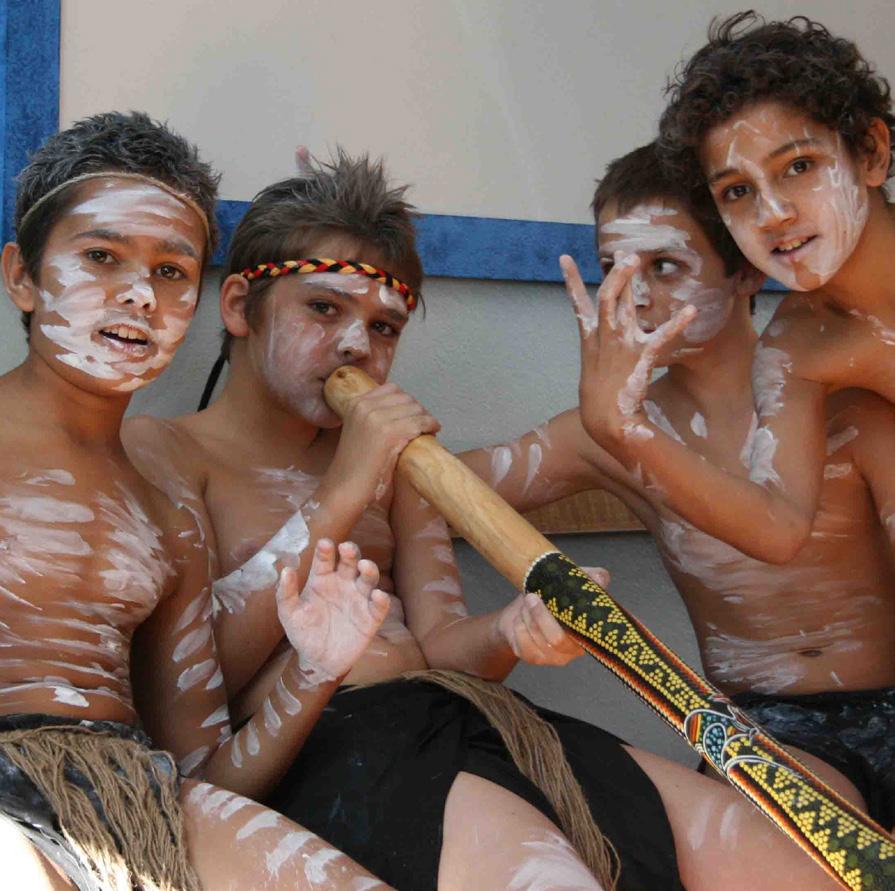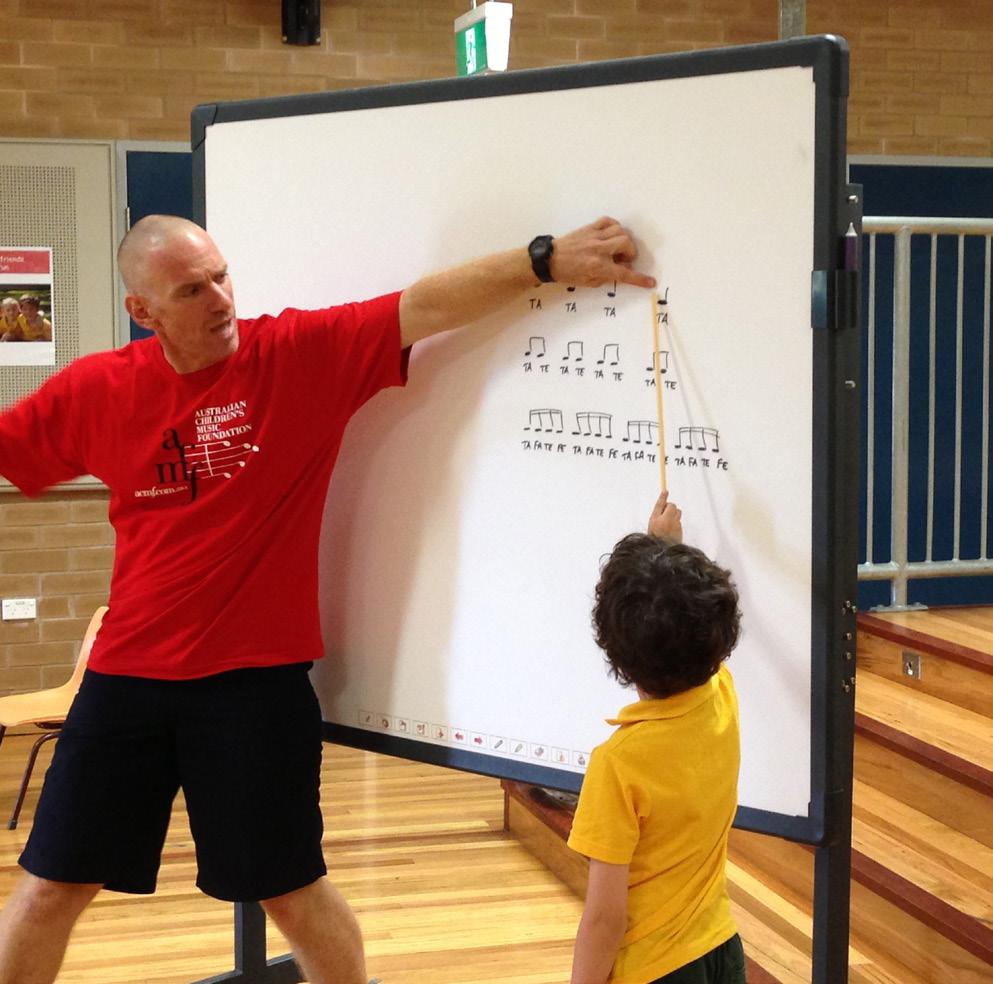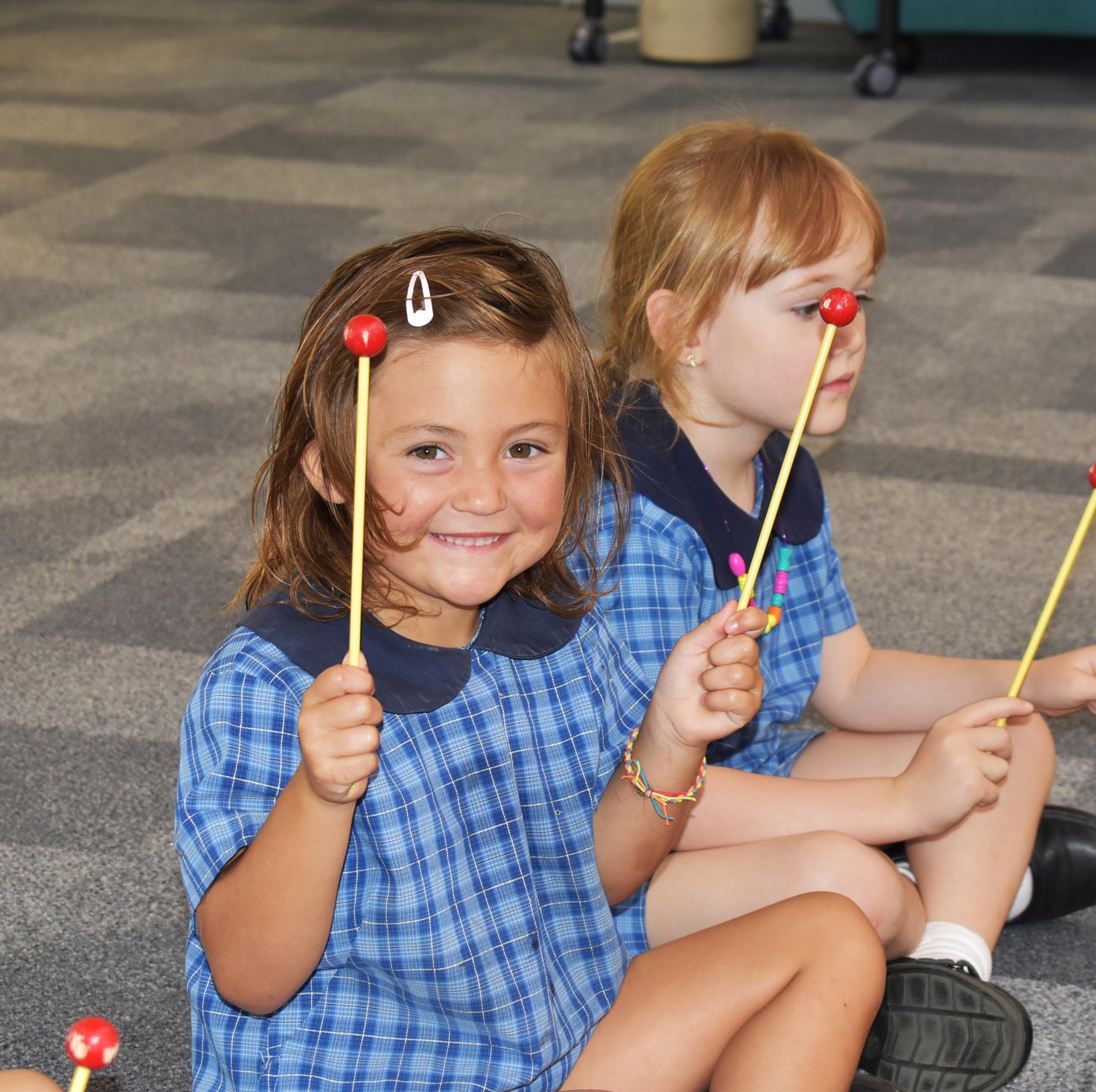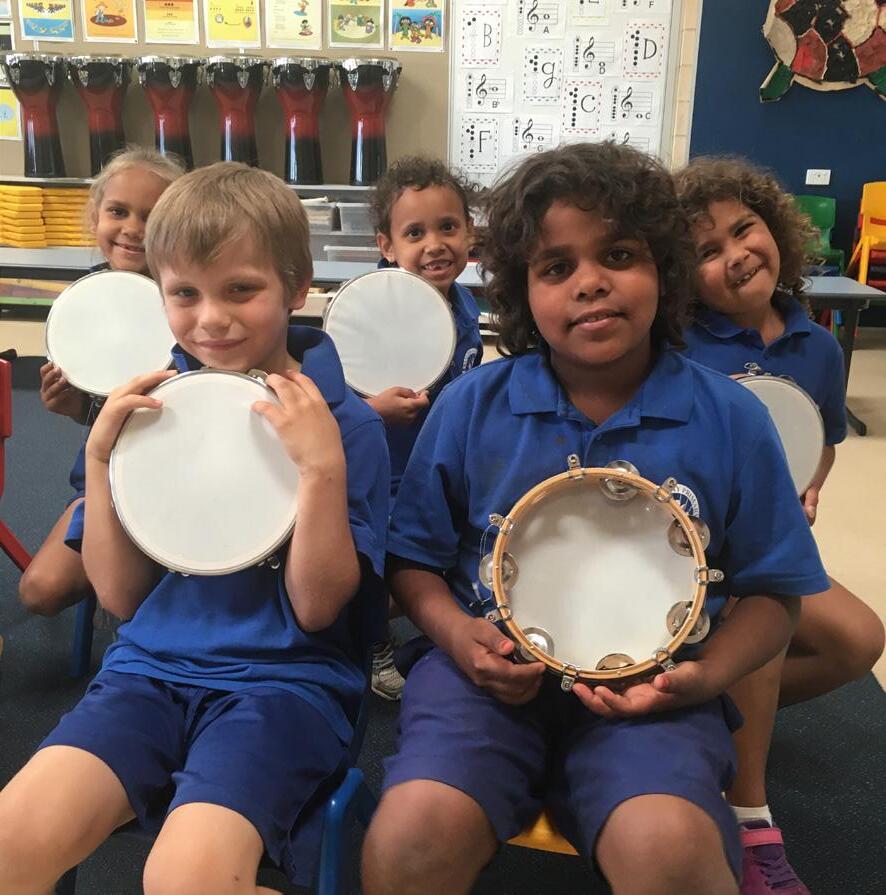










Children’s music education has outstanding educational and social advantages. Cognitive benefits include improved memory, attention, and spatial-temporal skills. Music inspires creativity and imagination with enhanced academic performance in language development, mathematical ability, and problem-solving.
Beyond academic achievements, music education nurtures creativity and imagination, self-expression, and emotional well-being. Participation in music programs enhances children’s self-esteem, self-confidence, and self-discipline. It provides a platform for exploring cultural heritage, building connections, and developing a sense of belonging.
Unfortunately, many Australian students miss out on music instruction. Currently, a large proportion of Australian primary school children have little or no access to music education. (1)
The Australian school curriculum relies heavily on generalist primary educators to teach music, despite their limited training in this field.
Sadly, the time and value dedicated to music learning within primary teaching degrees is at an all-time low. In 2022, the average amount of time spent training teachers is a mere 8 hours. (2)
Music education is not a standalone subject in most teaching degrees, leading to a lack of proper support and training for teachers in this crucial area.
For more than 20 years, ACMF has been providing multiyear long-term quality music education and instruments to disadvantaged children across the country. As at 2022, our programs run in 41 Schools, 6 Juvenile Justice Centres (JJCs) and 5 other community venues, with over 3200 children between prep and Year 12 participating weekly in our lessons.
In 2022, we commissioned an Impact Study to articulate, track and measure outcomes of our programs. The study drew on first-hand experience and perspectives of key stakeholders, including ACMF staff, school teachers, principals, students, JJC staff and detainees across our music programs.
The Impact Study found that over the long term (5 years+), our programs led to increased self-esteem and confidence, musical competency and aspiration, as well as improved life skills and interpersonal relationships.
There was unanimous feedback from principals, school teachers and school administrators on the importance of ACMF music lessons in creating social, academic and interpersonal relationship outcomes in their schools.
Long-term engagement in ACMF programs, particularly in regional and remote schools, demonstrated further evidence of medium and long-term outcomes being achieved.
The expertise of ACMF teachers, their ability to engage and relate to diverse student cohorts, and their skill in imparting music lessons have been recognised as crucial strengths of the program.
Generalist teachers in schools, equipped with ACMF techniques and materials, displayed increased confidence and were better able to teach music lessons even in the absence of ACMF teachers. This indicates the potential for sustainability and a positive ripple effect beyond our direct involvement.
Where engagement in schools/regions has been for longer than three years, with consistent teachers, there was further evidence of medium and long-term outcomes being achieved, especially in regional and remote schools.
I invite you to view the results of our Impact Study, and draw your attention to the ongoing need for and consistent support in improving this vital area of children’s lives.
We will build on this Study with ongoing six-monthly reporting via surveys that are sent to each venue. These evaluations offer an opportunity to gain independent quality assurance and expert insight into the effectiveness of our programs.
We are excited about the opportunity to build on the learnings of this Impact Study, so that ACMF can continue to deliver meaningful, long-term music education programs that will inspire creativity, support emotional and mental well-being, and improve educational outcomes for thousands of young Australians.
Don Spencer Frances Georgeson Founder and CEO General Manager


Our Vision
That every child has the opportunity to participate in the joy of music and the many educational and social benefits it provides.
The Australian Children’s Music Foundation (ACMF) is a not-for-profit organisation inspiring creativity and imagination by providing weekly music education classes and instruments to disadvantaged children and youth at risk throughout Australia.
Our ACMF music programs bring students joy and hope, and are proven to achieve positive educational and behavioural outcomes.

We’ve been singing the same tune for 20 years, since the Australian Children’s Music Foundation was founded in 2002, by singer/songwriter and entertainer: Don Spencer OAM. Don has a distinguished career in music, with multiple Platinum and Gold albums.
Through his many years working with children as a presenter on the TV show “Play School”, Don was struck by the incredible potential that music has to engage children, and improve a child’s quality of life.
The ACMF music programs are successful because they promise a LONG-TERM commitment – and are designed in partnership with each school, juvenile justice centre, or hospital – to meet the specific needs of the students, and to achieve the best and most lasting outcomes.
"Research has proven the importance of music and arts education. And yet so many children don't have access to music lessons. This is alarming. Every private school in the world teaches music. When I was young, every school had a music teacher and a piano. Where and why did this change?"
Don Spencer OAM Founder & CEO
Overview
The Australian Children’s Music Foundation (ACMF) supports disadvantaged children and at-risk youth across Australia.
The Australian Children’s Music Foundation (ACMF) has implemented music programs in schools, communities and Juvenile Justice Centres (JJCs) and music therapy in hospitals across the country since its inception in 2002. As at 2022 when this study was concluded, ACMF has delivered programs in 104 Schools, 21 Juvenile Justice Centres and 17 other community venues, with over 3,200 children between prep and Year 12 participating weekly in lessons.
Over
the last 20 years, the ACMF has impacted over 20,000 children across Australia
Provided over $1,100,000 worth of instruments
Delivered over 260,000 free music lessons
Inspired over 37,000 original songs in the National Songwriting Competition
As of 2022, 3,200 children between prep and Year 12 participate weekly in ACMF music programs. In total, the ACMF has delivered music programs in...
104 Schools 21 Juvenile Justice Centres
17 Hospitals, Youth Centres, PCYCs, Refuges
In recent years, music education has gained special relevance as part of the curriculum of compulsory education in most developed countries (3), both for its learning benefits and for its ability to promote the learning of other disciplines (4). Music also has the capacity to express, transmit, and evoke various emotions and affections in human beings (5) regardless of their backgrounds.
The link between music and emotions has also “contributed to the value of music as a discipline that can be implemented in formal education to develop students’ emotional competence.” (6) One of the other advantages of musical activities is that they can require collective participation, which “requires cooperation and coordination on the part of the members of a group, making them useful tools for the advancement of socio-emotional development.” (7) In addition, the social interactions required for music-making offer many opportunities for students to develop their abilities to evaluate their own feelings and at the same time try to relate to the feelings of others. Music education thus “has a strong impact on children and young people´s intellectual, social, and personal development and therefore on their psychological well-being.” (8)
Music occupies a special place in adolescence, with musical subcultures representing a powerful resource for the development of identity and values (9). Music interventions in youth justice settings with young people seek to improve health and behavioural outcomes by providing positive social experiences as well as addressing problematic attitudes and perceptions (10). They seek to promote identity development by providing positive opportunities and resources at the same time as distracting from negative influences in their environment (11).
Through years of operation, the ACMF already have anecdotal accounts that include several of the abovementioned impacts of music occurring through its programs in schools and JJCs. Through a facilitated workshop involving experienced teachers and ACMF staff, we developed a Theory of Change to map out the ways through which ACMF’s approach in schools and JJCs (its activities) led to the creation of short (first year in schools and JJCs) medium (second to fifth year in schools and JJCs) and longterm outcomes (beyond five years in schools and JJCs).


Theory of Change: How we create positive impact for young people and the wider community:
Through facilitated workshops involving experienced teachers and ACMF staff, we developed a Theory of Change (TOC) to map ACMF’s approach to creating an impact through our music lessons in schools and JJCs.
Consultations were carried out across the three states (NSW, VIC and WA) where ACMF run programs. These were conducted over three years between February 2020 and June 2022.
• Consultations covered 13 Metropolitan, Regional and Remote schools, 2 JJCs and involved engagement of almost 100 students, over 50 teachers and school staff, 10 parents and 6 JJC detainees.
• School consultations in NSW, VIC and WA represented 60%, 50% and 50% of schools covered by ACMF lessons in the regions respectively.
We follow this up with 6-monthly data collection through student and teacher surveys, to create a feedback loop to continuously validate and update findings (where appropriate), and ensure our programs are having the most effective impact.
Theory of Change (TOC)
Gather feedback from key stakeholders
Measure the impact of the program
Improve outcomes
Australian Children’s Music Foundation – Theory of Change
Outcomes
Inputs
(Figures for 2020 activities)
Programs delivered at 38 venues (schools and juvenile justice centres in NSW, VIC, WA)
5,945 total hours of music programs taught annually nationwide
- Creation of a positive environment
- Trust in ACMF Teachers from Children / Staff
- Children slowly building selfconfidence
- Children build camaraderie with others
- Children build basic music skills through lyrics and rhymes
- Improved Attendance on class days
- Children have increased focus during lessons
2,786
- Overall behaviour changes amongst children through sustained positive engagement
- Establishing a space for positive activities and interactions in JJCs
- Further development of musical competency
- Willingness to take on leadership roles in class and in school
- Connecting with other children
- Increased resilience amongst children
- Children gain an avenue for emotional release
- Positive impact on other areas of schooling
- Increased staff involvement in teaching music
- Increased community outreach through musical performances
- Families get involved in children’s lives
Self awareness & coping skills
Interpersonal & comms skills
Thinking & decision making skills
Creativity
Aspirations & musical competency
Attendance on
School attendance
Our rigorous evaluation proves and improves what we do and the impact we create. Capturing and listening to the voices of those who participate in our programs is integral to informing our program design and delivery.
The Impact Study found that over the long term (5 years+), our programs led to increased self-esteem and confidence, musical competency and aspiration, as well as improved life skills and interpersonal relationships.
There was unanimous feedback from principals, school teachers and school administrators on the importance of ACMF music lessons in creating social, academic and relationship outcomes in their schools. Where engagement in schools/regions has been for longer than three years, with consistent teachers, there was further evidence of medium and long-term outcomes being achieved, especially in regional and remote schools.
Said... ACMF classes had a moderate or major impact on helping children feel good about themselves
Said... ACMF classes had a moderate or major impact on boosting children’s confidence to learn and do new things
Said... ACMF classes had a moderate or major impact on expanding children’s creativity
Boost
Our Study found that ACMF music lessons empowered students by offering activities and opportunities that enhanced confidence and self-esteem, improved learning outcomes and enabled students to succeed in other classes.
Students gained tangible skills through creating music and videos, boosting their confidence among peers. Performing in public spaces and ensembles further built confidence and self-esteem.
• ACMF teachers bring musical expertise to schools, allowing students to engage in activities that are usually inaccessible.
• Music lessons at school give children a chance to discover new talents, succeed, and gain assurance.
• Improved confidence and self-esteem resulting from music classes enhance students’ participation in other subjects and school activities.
• Creating tangible outcomes like music videos and songs in music lessons boosts children’s self-assurance among their peers.
• ACMF teachers create opportunities for children to perform in public, in bands and ensembles, further boosting their self-belief.
“ I’ve seen neuro diverse students really get a lot out of the program, so students that would ordinarily not be engaged in maybe the academic side of literacy and numeracy, you see them really hit their strides and come to life in that space.” (School Principal)
97%
of overall respondents reported ACMF program had a moderate or major impact on providing a safe music program space for emotional expression amongst children
99%
of overall respondents reported that ACMF music classes had a moderate or major impact on children feeling good about themselves

Students reported improved resilience, motivation, creativity, and academic engagement from our programs.
They learned new songs, chords, and instruments, which boosted their drive to master new skills. Music concepts like rhythm and beat counting enhanced their abilities in Maths and English, while following instructions and focusing in lessons improved attentiveness and focus in other classes.
• ACMF program improves children’s resilience and motivation in the classroom.
• Fosters creativity and indirectly contributes to educational outcomes.
• Music concepts learned in the program enhance skills in subjects like Maths and English.
• Music lessons improve attentiveness and focus in other classes.
“ Music is Maths, Music is English because it’s about listening, it’s a really big listening activity. It’s about resilience, it’s about collaboration and cooperation, and it goes through so many different things as well as being obviously part of the arts. So yes, it’s far reaching and the skills that come through music here have benefited the students in other key learning areas.” (School Teacher)

91% of respondents said ACMF music lessons had a moderate or major impact on instilling leadership skills in children
95% of respondents said ACMF music lessons had a moderate or major impact on increasing children’s resilience when faced with new challenges
85%
of respondents said ACMF music classes had a major or moderate impact on improving children’s ability to focus and engage on tasks during other lessons
77%
of respondents said ACMF music lessons had a moderate or major impact on contributing to improvements in children’s literacy and numeracy outcomes in school
Early exposure to music instilled children’s interest and drive, fuelling ongoing engagement and aspirations to continue learning music into high school.
The program empowered young Indigenous children, fostering pride through music and performances. ACMF music lessons were an entry point for children from culturally and linguistically diverse backgrounds to engage with school activities.
• ACMF programs boost aspirations for children from lower socio-economic backgrounds to continue music in high school.
• Early exposure to music in primary school instils interest and drive, and fuels ongoing engagement.
• Music lessons enhance engagement for children from diverse backgrounds.

97%
of respondents said that ACMF music programs had a moderate or major impact on improving children’s communication skills
91%
of respondents said the ACMF music programs had a moderate or major impact on improving children’s communication skills
98%
of respondents said the ACMF music program had a major impact on enabling positive social interaction and peeracceptance amongst children at school
“ Learning music promotes role modelling in the community, you know, having senior boys get up and play provides self-esteem and self-pride for other Indigenous kids.”
(Clontarf youth worker)

99%
of respondents said ACMF music lessons had a moderate or major impact on building children’s self-confidence to learn and do new things
Music lessons aided social cohesion and promoted recognition of talents among classmates.
Collaboration in music classes enhanced teamwork and reduced anti-social behaviour. Students with special needs benefitted from the calming effects of music and integration with mainstream peers. In remote areas, music lessons fostered cultural cohesion and positive engagement. ACMF teachers’ holistic approach involving school staff created a caring and supportive community.
• Music lessons level the playing field and foster recognition of students’ talents.
• Cooperation in music activities improves teamwork and reduces anti-social behaviour.
• Music classes benefit students with special needs and promote engagement with mainstream peers.
• Music lessons enhance cultural cohesion and parent-child engagement in remote and regional communities.
• ACMF programs encourage collaboration among school staff, creating a caring and supportive community for students.
“… (the ACMF program) has made us come closer with each other. Before I was in here, I was never really friends with these guys but now that we’re all in here together, it’s like we’re just one big group and it’s just yeah, it’s made me happier.” (School Student)
“ I think I’ve noticed music is an important connector for culture. For our school it also brings together all those cultural backgrounds so our parents can appreciate it no matter where in the world the family are from, even where English is usually not their first language. For events like readings or a play, they don’t come because they might not be able to keep up with it. But, music is a universal language, even if they don’t know the lyrics they can still enjoy the music, they can enjoy the collaboration, they can enjoy the kids’ faces, so for us it’s an entry point to bring people in.” (School Principal)

Long-term and regular ACMF music tuition in schools enabled children to significantly improve their music skills, with some even earning music scholarships for high schools.
In WA, the success and interest in music lessons resulted in the formation of new bands that perform for the school and local community. ACMF lessons have not only fostered musical growth but also opened doors to further opportunities and performances for students.
• ACMF lessons have led to significant improvement in music skills, with some students earning scholarships for high schools.
• Music lessons in WA have inspired the formation of new bands, performing for the school and community.
• Long-term engagement in the NSW and VIC programs has developed students’ ability to read and perform formal pieces of music.

91%
of respondents said the ACMF music program had a moderate or major impact on increasing children’s interest and abilities in music theory and performance

“ We’ve had a number of students obtain music scholarships from our schools, and they may not have extra tuition outside the school so you would say it’s mainly attributable to their time in the (ACMF) music lessons here. Every year there seems to be at least one student from the year six cohort that picks up a scholarship of a musical nature.” (School Principal)
Our Study found that tailored music lessons in Juvenile Justice Centres provided detainees with a creative outlet and a sense of hope.
Positive engagement encouraged regular participation, fostering self-regulation and self-confidence. Music lessons created a demonstration effect, inspiring others to join and fostering positive connections in a challenging environment.
• Music lessons in JJCs offer a creative and positive outlet for detainees.
• Detainees show regular engagement and enthusiasm for music lessons.
• Music lessons in JJCs inspire hope and exploration upon release.
• Learning music fosters positive interactions and a sense of community.
• Music lessons promote self-regulation and self-confidence in JJCs.
“ It was great to have access (to the ACMF teacher) – not only just having access, it gave your mind something to do as well.“ (JJC Detainee)
“ Two of the biggest things that these lessons do for them (detainees) is Self-Regulation and Self-Confidence. It gives them a place of refuge in this environment where they can focus on themselves and get away from all the noise around them”
(JJC staff member)
77%
of respondents said the ACMF music program had a moderate or major impact on contributing to increased school attendance during ACMF lesson days
74%
of respondents said the ACMF music program had a moderate or major impact on contributing to increased school attendance in general

The following strengths were identified as key elements of our program’s success
Unanimously The Quality of Our Teachers
We Create a Safe Space for Students Our Long-term Commitment to Communities We Improve Engagement and Build Capacity in the Classroom

78% of teachers strongly agreed the ACMF-run music lessons provided a positive learning environment for children
76%
of teachers strongly agreed ACMF teachers were effective in engaging the children during music lessons
54% of teachers strongly agreed they had been able to expand their teaching skillset as a result of observing and participating in ACMF-led music classes
ACMF Teachers Received Unanimous Praise for Their Quality, Skill, and Ability to Engage Children of all Backgrounds and
ACMF teachers were unanimously praised for their exceptional quality, skills, and ability to create a positive learning environment that engages children from diverse demographic backgrounds and varying capabilities and needs. They were able to engage students who struggled in traditional academic subjects like literacy, numeracy, and science, helping them discover areas in which they can excel.
In JJCs and outreach programs, ACMF teachers successfully built positive relationships with children who have disciplinary issues or have experienced various forms of trauma.
“ What Dave does is priceless. Essentially what he does is plant a seed in them that can be harvested over time. Once they know that they can do something positive that they like, they will keep coming back.” (JJC staff member)


ACMF teachers’ long-term commitment to students through partnerships with schools was greatly praised for providing the consistency needed to address the complex issues facing students, and building trust with local communities over time. This long-term commitment with the same teacher running classes is vital in the context of providing services for Indigenous communities. This in turn promoted sustained engagement with ACMF sessions and positive outcomes for students.
“ The consistency with kids is important – if it’s consistent in their lives every Friday, if they know it’s going to happen, then it works with their disabilities. It’s just an experience that kids won’t get – it’s sustained. If it’s only every now and then, it won’t have the same social impact.” (School Parent)
ACMF music lessons gave students the ability to express themselves and communicate through music, which provided a positive and calming avenue for emotional release. This was especially important and relevant to ACMF students suffering from traumatic and difficult home backgrounds, histories of substance abuse and those in JJCs.
“Kids from traumatic backgrounds – they can engage in expressive ways in terms of feelings – and have a positive impact.” (School Teacher)
“When I play music I don’t feel like I’m in prison during the lessons, feel good about myself.”(JJC Detainee)


Principals reported increased attendance on ACMF music lesson days. Students who were disengaged in traditional classes, eagerly anticipated these lessons as they provided enjoyable and creative outlets for showcasing their talents and abilities and a place to excel in areas outside the classroom. Teaching skills used by ACMF teachers have been adopted by some teachers in their own classes to better engage students and improve focus and attention.
“ By putting it on Mondays, it meant that everybody wants to come to school. Mondays are an important day for a classroom because you set up all the structures for the week or the routine. Yes, so by having music on Monday, we have more children in attendance. It can ripple out into all the other things they were learning about and all their classroom routines and help them with friendship issues as well.”
(School Principal)
1 Collins, A. & Hocking, R. (2023) Fading notes: The state of music education for the next generation of primary teachers – summary report. Alberts The Tony Foundation.
2 Collins, A. & Hocking, R. (2023) Fading notes: The state of music education for the next generation of primary teachers – summary report. Alberts The Tony Foundation.
3 Carrillo C., Viladot L., Pérez-Moreno J. Impact of music education: A review of the scientific literatura Rev. Electrónica Complut. Investig. Educ. Music. 2017
4 Rickard N.S., Vasquez J.T., Murphy F., Gill A., Toukhsati S.R. Benefits of a classroom based instrumental music program on verbal memory of primary school children: A longitudinal study. Aust. J. Music Educ. 2010
5 Thompson W.F., Quinto L. Music and Emotion: Psychological Considerations. In: Schellekens E., Goldie P., editors. The Aesthetic Mind: Philosophy and Psychology. Oxford University Press; Oxford, UK: 2011.
6 Campayo-Muñoz E.Á., Cabedo-Mas A. The role of emotional skills in music education. Br. J. Music Educ. 2017
7 Blasco-Magraner JS, Bernabe-Valero G, Marín-Liébana P, Moret-Tatay C. Effects of the Educational Use of Music on 3- to 12-Year-Old Children’s Emotional Development: A Systematic Review. Int J Environ Res Public Health. 2021 Apr
8 ibid
9 Miranda, D. and Claes, M. Rap music genres and deviant behaviors in French-Canadian adolescents. Journal of Youth and Adolescence 2004
10 Wilson, D., Caulfield, L. and Atherton, S. Good vibrations: the long-term impact of a prison-based music project. Prison Service Journal, 2008
11 Daykin N, De Viggiani N, Pilkington P, Music making for health, well-being and behaviour change in youth justice settings: a systematic review, Health Promotion International, 2012


At Derby High in WA, musically inclined students or those interested in music can drop in to learn instruments with ACMF teacher Steve during designated lesson times.
During our visit for NAIDOC week, two boys, Talon and Bradon were going to play four songs of their choice with one of the school teachers on drums, Talon on guitar and vocals, Bradon on bass, and the Principal as a guest on vocals for one song. The way the activity was structured empowered the students as it was dictated by their desire to learn and perform and allowed them to positively interact with the school Principal and teacher in a very different forum than in a classroom. It clearly built their confidence to be able to demonstrate their talent and skills to leaders in the school. Having access to Steve over the years to teach and guide them has been very valuable for the boys and he has inspired them to aspire to do greater things with their abilities.
Only a few years ago, Talon was having multiple issues at school due to a health condition and a lack of self-confidence.
“Talon has a degenerative condition – He played last post for ANZAC Day – and he did it all by ear – he was tuning himself in. Three years ago, we couldn’t get a word out of him – and now he’s singing a song in front of a crowd. Talon could be aggressive – but now he’s not at aggressive at all – he has a place where he can go expel that frustration – and he will just go into the music room and play himself calm. Music has helped him find a way around his issues.” Derby High Principal
During the lessons, the talent and confidence in the boys was clearly demonstrated when Bradon was taught a new song to play at the start of the lesson and was then able to join the rest of the band to cohesively play together.
An example of the benefits of long-term engagement in the school is demonstrated by the close relationship that Steve has built with Talon over the years. Not only has he nurtured and brought out his musical skills, but he has also been supporting him with numeracy skills outside of music lessons when he stays back to practice Maths after music practice. This has given him the confidence to regularly engage positively in the school with teachers and classmates. He has also become a role model for what young Indigenous children in the community can achieve.
After the class we spoke with Bradon and Talon to ask them what they had got out of their music lessons with Steve and what their aspirations were.
“Music makes me feel free. I’d like to make music too and teach it to my families, and have them pass that down.
I would feel pretty sad if we didn’t have music at school with Mr. Steve. It would be boring, very boring.” Talon
“I like the learning methods, he described it really easily and he doesn’t get too mad if I mess up. I’d like to produce and make music, not just with instruments. I like how Mr Steve teaches me songs that I like, he also lets me learn new things everyday with him.” Bradon
“Music makes me feel free. I’d like to make music too and teach it to my families, and have them pass that down.” Talon


Suite 401, 110 Pacific Highway
North Sydney NSW 2060
t. 02 9929 0008
e. contact@acmf.com.au